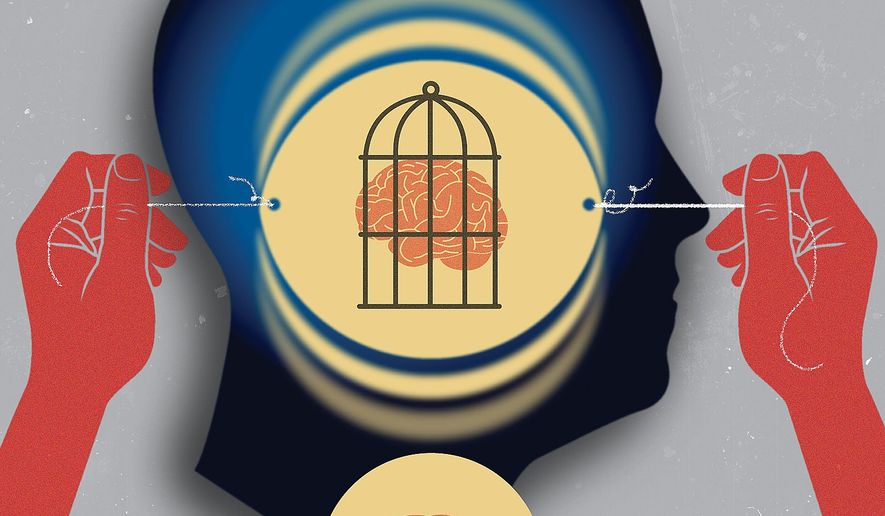OPINION:
It’s been observed — and variously attributed to Mark Twain, Will Rogers and Ronald Reagan, among others — that what gets us into trouble is not what we don’t know, but what we know that isn’t so.
For example, we know that modernity, like gravity, exerts a pull that nations and their rulers, sooner or later, find irresistible. As John Kerry said to Vladimir Putin after the Russian president invaded Ukraine five years ago: “You just don’t in the 21st century behave in 19th century fashion.” Mr. Putin’s non-verbal reply: And why not?
Also widely believed: That the arc of history bends toward justice — or at least in some meaningful direction. Such historical determinism is supported by no evidence whatsoever as far as I’m aware.
A related article of faith is that nations evolve, eventually becoming liberal democracies. It’s true that Germany and Japan transformed after World War II. But that was the result of unequivocal defeat and prolonged American occupation. Meanwhile, as suggested above, post-Soviet Russia remains decidedly illiberal and undemocratic. As for nations that used to be either Soviet constituent republics or Soviet vassal states, the jury is still out.
Conventional wisdom has long held that when people become wealthier, when they gain economic power, they demand political power to go with it. And they get it because those in charge conclude that governing through consent is preferable to ruling through fear. China, simultaneously becoming richer and more authoritarian, debunks that theory.
We think we know that democratic habits, once acquired, are not easily broken. In Turkey, however, people have been casting ballots for generations. Turkey now has a veritable president for life, one who fancies himself less a politician in the Western sense than a sultan in the Ottoman sense.
Americans and Europeans, on both the left and the right, are inclined to believe in homo economicus, a fictional creature who rationally prioritizes the optimization of economic benefits. Even when our adversaries and enemies make clear that what motivates them is ideology and/or theology, we tell ourselves they don’t really mean it.
This delusion was among the reasons President Obama gave Tehran’s theocrats billions of dollars, and offered to integrate them into the global financial and trading system. Significant economic improvements for ordinary Iranians could have been the result. The ruling clerics, in exchange, were asked only to end their nuclear weapons program and become reasonably law-abiding global citizens.
Instead, of course, they spent the bulk of the cash on ballistic missiles, terrorism, Shia militias in Syria and Iraq, and Houthi rebels in Yemen. Ruhollah Khomeini, the first supreme leader of the Islamic Republic of Iran, famously said: “This revolution was not about the price of watermelons.” His successors — already fabulously wealthy themselves — were not about to prioritize affluence for their fellow countrymen over jihad against their enemies.
President Trump took a similar approach toward North Korea, offering to make the hermit kingdom as crazy, rich Asian as Singapore. It is now apparent that the price he put on that, “final fully verified denuclearization,” is more than Kim Jong-un is willing to pay. The dynastic dictator also lives a life of extraordinary luxury and cares not a whit whether his subjects eat bulgogi or tree bark.
We know little about the Palestinian-Israeli peace plan being developed for Mr. Trump by Jared Kushner, his adviser and son-in-law, and Jason Greenblatt, his special representative for international negotiations. But I’m willing to give odds that it will hold out the promise of dramatically improved living standards for average Palestinians, as well as statehood, in exchange for a serious commitment to peaceful coexistence with the Jewish state.
I’ll give even better odds that Palestinian leaders won’t be tempted by such a tradeoff. Those who use a secular vocabulary — e.g. Palestinian Authority President Mahmoud Abbas, will declare that the rights of his people are not for sale. Those who use a theological vocabulary, e.g. Hamas military leader Yahya Sinwar, will forthrightly proclaim their religious duty to recover all the lands that Allah has endowed to the Muslims. (Because that contradicts things most journalists know that aren’t so, most will avoid reporting it.)
Perhaps you’re thinking: But surely there is universal understanding of the value of negotiations, and why peace through compromise is preferable to a prolonged conflict that ends with one side victorious and one side defeated. Perhaps you recall what Mr. Kerry also said: “This does not have to be a zero-sum game.”
If so, you think you know what diversity means, but you don’t. Diversity implies more than a smorgasbord of cuisines, clothing and music. It implies widely differing perspectives on what’s important in this world and, for some people, the next world as well.
George Orwell, reviewing “Mein Kampf” in 1940, observed that Hitler “has grasped the falsity of the hedonistic attitude to life.” He “knows that human beings don’t only want comfort, safety, short working-hours, hygiene, birth-control and, in general, common sense; they also, at least intermittently want struggle and self-sacrifice.”
If that’s true of the followers of extremist ideologies, how much more must it apply to would-be conquerors and rulers?
The comforting notion that skilled diplomats bearing gifts and not baring their teeth can seduce and reform those who threaten us may be the most important thing we know that simply isn’t so.
• Clifford D. May is president of the Foundation for Defense of Democracies and a columnist for The Washington Times.




Please read our comment policy before commenting.